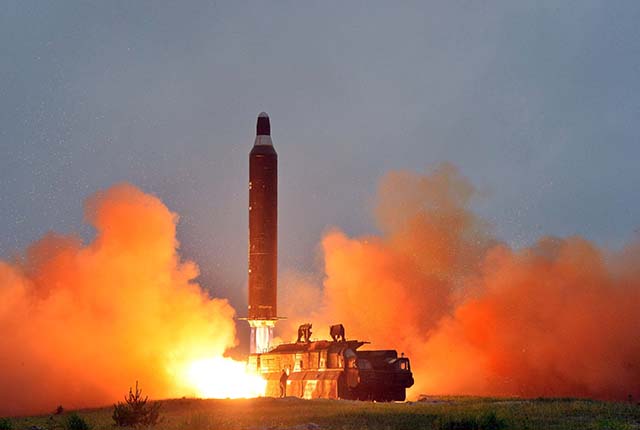
Strange how few, clear, words can be misled with dull budding. This is the case with the analysis by Michael Elleman, a senior fellow at the International Institute for Strategic Studies (IISS), who points to arms dealers and international smugglers operating in Russia and Ukraine as responsible of North Korean missile technology leap.
Just a few hours after the publication of the analysis, and after mainstream media reported the news with broad simplifications, the Ukrainian media counter-offensive attacked against Elleman. With the usual argumentations: “paid by the Kremlin“, “a fake news from Russia aimed to discredit Ukraine”, “a Kgb agent”.
Strange, because in Elleman’s words Russia is the main suspect.
Arms dealers and transnational criminal networks
Let’s see what Elleman wrote. After narrowing his search to the type of technology used by Kim Jong-un’s engineers, Elleman concludes that new missile uses an RD-250 engine. “Such expertise is available at Russia’s Energomash concern and Ukraine’s KB Yuzhnoye. One has to conclude that the modified engines were made in those factories.
The RD-250 was originally designed by the Glushko enterprise of Russia, and produced and incorporated into the first stage of the R-36 (SS-9) ICBM and the Tsiklon-2 satellite launcher by KB Yuzhnoye of Ukraine.
Russia stopped purchasing the Yuzhnoye rocket in 2006 in favour of an indigenous system. [Today] there are almost certainly hundreds, if not more, of spares stored at KB Yuzhnoye’s facilities and at warehouses in Russia where the Tsiklon-2 was used. Spares may also exist at one or more of Energomash’s many facilities spread across Russia. Because the RD-250 is no longer employed by operational missiles or launchers, facilities warehousing the obsolete LPEs are probably loosely guarded. A small team of disgruntled employees or underpaid guards at any one of the storage sites, and with access to the LPEs, could be enticed to steal a few dozen engines by one of the many illicit arms dealers, criminal networks, or transnational smugglers operating in the former Soviet Union. The engines (less than two metres tall and one metre wide) can be flown or, more likely, transported by train through Russia to North Korea”.
North Koreans at the Missile Market
It’s a hypothesis. Made by a consulting senior fellow for Missile Defence at one of the world’s most trusted think-thank, who previously spent 18 months a UN missile expert for weapons inspection missions in Iraq and two decades as a scientist at Lockheed Martin’s Research and Development Laboratory. And, most of all, a physician who, from 1995 to 2001, led a program in Russia aimed at dismantling obsolete long-range missiles.
Yet, a hypothesis. That does not justify the attacks by the Ukrainian side and – more importantly – amplifies the silence by the Russian side.
Even more, because Elleman points out in clear letters that his is not an accusation to Ukraine. “This is not to suggest that the Ukrainian government was involved, and not necessarily Yuzhnoye executives. Workers at Yuzhnoye facilities in Dnipropetrovsk and Pavlograd, […] that lie close to the front lines of the Russian-controlled secessionist territory, […] were likely the first ones to suffer the consequences of the economic misfortunes, leaving them susceptible to exploitation by unscrupulous traders, arms dealers and transnational criminals operating in Russia, Ukraine and elsewhere”.
Elleman also points out that the Ukrainian authorities, on the one hand, are fighting these dangers and, on the other, that there is already evidence of an interest by North Korean secret service for Yuzhnoe: “In 2012, for example, two North Korean nationals were arrested and convicted by Ukrainian authorities for attempting to procure missile hardware from Yuzhnoye. “
True or supposed, this is a case the importance of Ukraine and Donbass for the West.
@daniloeliatweet
Strange how few, clear, words can be misled with dull budding. This is the case with the analysis by Michael Elleman, a senior fellow at the International Institute for Strategic Studies (IISS), who points to arms dealers and international smugglers operating in Russia and Ukraine as responsible of North Korean missile technology leap.
Just a few hours after the publication of the analysis, and after mainstream media reported the news with broad simplifications, the Ukrainian media counter-offensive attacked against Elleman. With the usual argumentations: “paid by the Kremlin“, “a fake news from Russia aimed to discredit Ukraine”, “a Kgb agent”.





